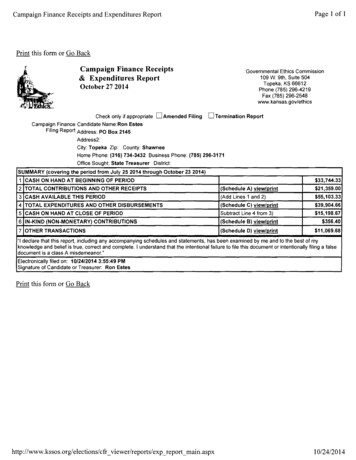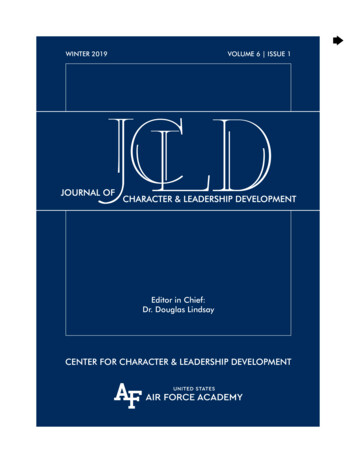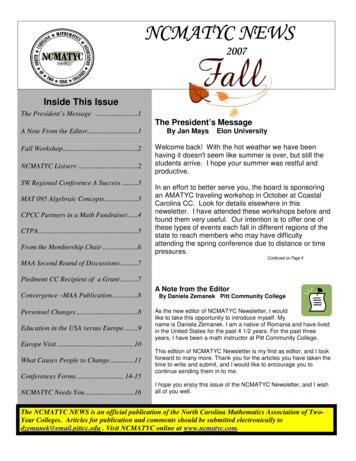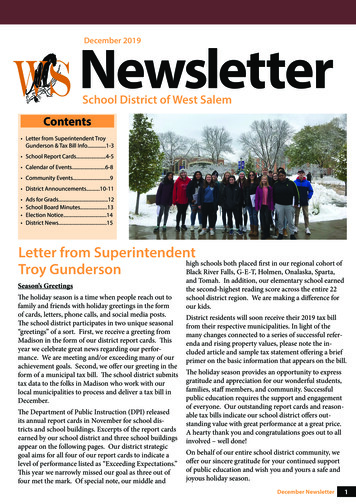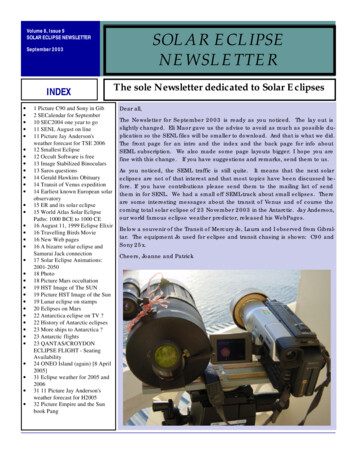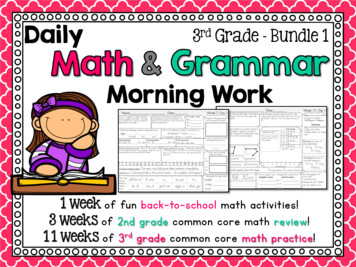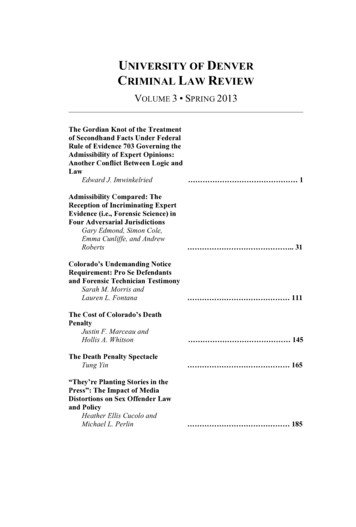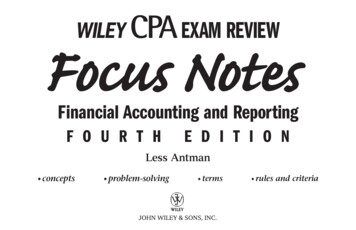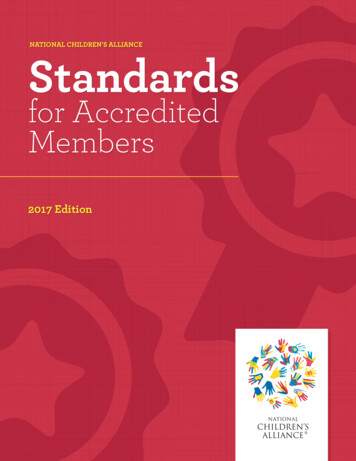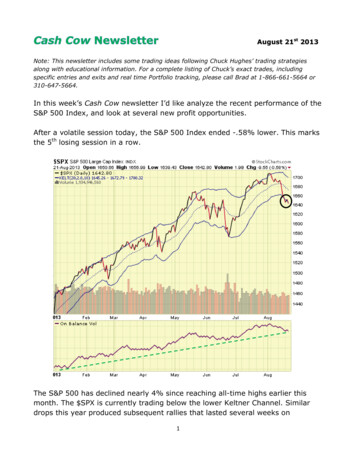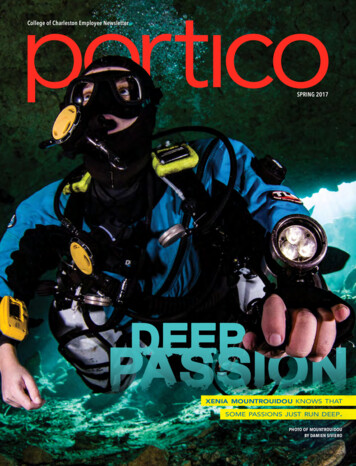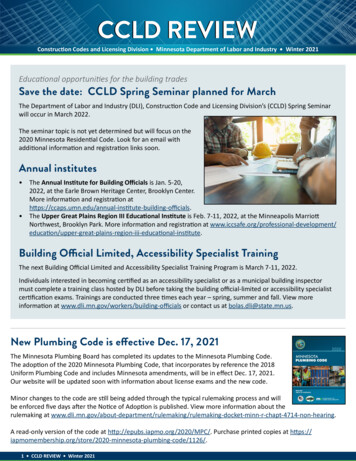
Transcription
CCLD REVIEWConstruction Codes and Licensing Division Minnesota Department of Labor and Industry Winter 2021Educational opportunities for the building tradesSave the date: CCLD Spring Seminar planned for MarchThe Department of Labor and Industry (DLI), Construction Code and Licensing Division’s (CCLD) Spring Seminarwill occur in March 2022.The seminar topic is not yet determined but will focus on the2020 Minnesota Residential Code. Look for an email withadditional information and registration links soon.Annual institutes The Annual Institute for Building Officials is Jan. 5-20,2022, at the Earle Brown Heritage Center, Brooklyn Center.More information and registration officials.The Upper Great Plains Region III Educational Institute is Feb. 7-11, 2022, at the Minneapolis MarriottNorthwest, Brooklyn Park. More information and registration at te.Building Official Limited, Accessibility Specialist TrainingThe next Building Official Limited and Accessibility Specialist Training Program is March 7-11, 2022.Individuals interested in becoming certified as an accessibility specialist or as a municipal building inspectormust complete a training class hosted by DLI before taking the building official-limited or accessibility specialistcertification exams. Trainings are conducted three times each year – spring, summer and fall. View moreinformation at www.dli.mn.gov/workers/building-officials or contact us at bolas.dli@state.mn.us.New Plumbing Code is effective Dec. 17, 2021The Minnesota Plumbing Board has completed its updates to the Minnesota Plumbing Code.The adoption of the 2020 Minnesota Plumbing Code, that incorporates by reference the 2018Uniform Plumbing Code and includes Minnesota amendments, will be in effect Dec. 17, 2021.Our website will be updated soon with information about license exams and the new code.Minor changes to the code are still being added through the typical rulemaking process and willbe enforced five days after the Notice of Adoption is published. View more information about therulemaking at ing-docket-minn-r-chapt-4714-non-hearing.A read-only version of the code at http://epubs.iapmo.org/2020/MPC/. Purchase printed copies at lumbing-code/1126/.1 CCLD REVIEW Winter 2021
Schedule of board and council meetingsBelow is a schedule of meetings for boards and council supported byCCLD.Visit s to viewmeeting minutes, agendas, rulemaking documents and schedules forthese meetings and additional boards and councils.Board of Electricity Jan. 11, 2022 April 12, 2022 July 12, 2022 Oct. 11, 2022Board of HighPressure Piping Jan. 13, 2022 April 14, 2022 July 14, 2022 Oct. 13, 2022Construction CodesAdvisory Council Jan. 13, 2022 (tentative) Feb. 10, 2022 (tentative)Plumbing Board Jan. 18, 2022 April 19, 2022 July 19, 2022 Oct. 18, 2022Interested in serving on a board or council?Minnesotans are encouraged to apply for positions on state councils,boards, task forces and commissions through the Secretary of State’sOpen Commissions and Appointments process. Visit s for more information abouthow to apply.Find code requirements in Local Code LookupVisit our one-stop “Local Code Lookup” at http://workplace.doli.state.mn.us/jurisdiction – to find local code requirements and code inspectors inone place.The online search tool helps users find which code authority has localjurisdiction for permits, plan review and inspections. It also lists contactinformation for inspectors throughout Minnesota.Follow DLI on social mediaCheck us out at: www.twitter.com/mndli www.facebook.com/MinnesotaDLI www.youtube.com/user/mndli1 www.linkedin.com/company/mndli/2 CCLD REVIEW Winter 2021CCLD Review is a quarterlypublication of the MinnesotaDepartment of Labor andIndustry.Receive email notificationwhen an issue is available bysubscribing online.Contact informationCCLD main contact infoPhone: 651-284-5012Toll-free: 1-800-657-3944Fax: 651-284-5746Visit the Contact Us pageLicensing tor licenses andbonds:651-284-5034(Including: electrical, HPP, plumbing,residential, manufactured structures,mechanical bonds, technology system,water conditioning)Personal licenses andcertificates: 651-284-5031(Including: boiler engineers,electricians, plumbers, power limitedtechnicians, pipefitters, unlicensedindividuals, building officials)Electrical informationPhone: 651-284-5026Fax: 651-284-5746DLI.Electricity@state.mn.usBoiler, high-pressure piping,boats-for-hire inspectionPhone: 651-284-5544Fax: 651-284-5746DLI.Code@state.mn.usPlumbing informationPhone: 651-284-5063Fax: 651-284-5746DLI.Plumbing@state.mn.usLicense enforcement detailsPhone: 651-284-5069Fax: 651-284-5746DLI.Contractor@state.mn.usContractor registrationPhone: 651-284-5074DLI.register@state.mn.us
Technical Advisory Group presents findings; CCAC recommends rulemakingIn September, the Flood Resistant Design Technical Advisory Group (TAG) presented its review of the ASCE/SEI24-14 Flood Resistant Design and Construction (ASCE 24-14) to the Construction Codes Advisory Council (CCAC).Previously, the CCAC requested the group review ASCE 24-14 for its potential adoption, with amendments, asthe new floodproofing code. A summary of the advisory group’s findings has been submitted to the CCAC andstakeholders for review and comment.Commercial Energy CodeBased on the Commercial Energy Code TAG members’ review, the CCAC recommended that DLI moveforward with adoption of ASHRAE 90.1-2019, with amendments, as the Commercial Energy Code. With thatrecommendation, DLI staff are developing amendments to the current rules and modifications to some of theprovisions.Follow the rulemaking processDLI began the formal rulemaking process to adopt ASHRAE 90.1-2019 by publishing a Request for Comment inthe State Register. Follow the rulemaking process by viewing the docket at ction-codes-and-licensing-rulemaking. Submit comments about the rulemaking via email atdli.rules@state.mn.us.Technical Advisory Groups review proposed legislationThe CCAC appointed two Technical Advisory Groups to review and comment on proposed legislations.The Window Cleaning Anchor TAG met twice to review statutory requirements, review changes proposed duringprevious legislative sessions and discuss window cleaning safety.The Building Code Series 1 TAG met three times to review proposed legislation addressing adult changing stations;the calculation of permit fees for new residential construction; municipal fee reporting threshold and permitrequirements; requiring certain codes to be adoptedby law no sooner than 2026; and requiring a return onMore informationinvestment for changes to the residential energy code.View more about the CCAC and advisory groupsat www.dli.mn.gov/about-department/boardsBoth advisory groups will present their review of l.proposed legislation at a future CCAC meeting. TheCCAC will review the findings of the TAGs and makerecommendations to the commissioner and respectivelegislators.View more about the CCAC and advisory groups at s/construction-codes-advisory-council.Looking for a phonenumber or email address?3 CCLD REVIEW Winter 2021Visit r contact information for staff members.
Residential building contractor continuing education reminderAll qualifying builders and remodelers (QBs and QCs) must complete14 hours of DLI-approved continuing education by the expiration dateof their builder or remodeler registration, which may not be the samedate as the expiration date for their business license (BC or CR).Contractors can check the continuing education date of theirqualifying builder or remodeler by looking up their licenseinformation in our License and Registration Lookup at spx. A list of approved continuingeducation courses is at ness management strategies continuing educationDue to enforcement cases resulting from some contractors’ failure to use sound business management practices,the state legislature updated continuing education rules for residential building contractors to require training aboutbusiness management strategies.Residential building contractors must complete at least 14 hours of continuing education every two years. Of the 14hours, at least one hour must relate to the Minnesota Energy Code and at least one hour must relate to businessmanagement strategies.Questions? Contact us at 651-284-5031 or dli.license@state.mn.us.Unlicensed contractor fined 15,000 for electrical, plumbing work A Brainerd contractor who engaged in unlicensed residential building contracting activities and breached itscontract with a homeowner was ordered to cease and desist from unlicensed activity and fined 12,500. A licensed electrical and residential building contractor based in Salt Lake City, Utah, failed to completework for numerous homeowners resulting in incomplete solar installation projects.DLI revoked the contractor’s licenses and ordered the contractor to stop workingin Minnesota. The contractor filed bankruptcy and DLI staff are working with thebankruptcy trustee and others to help consumers get their solar systems completed andconnected to their local electric utility. A licensed Albert Lea plumbing contractor failed to ensure its unlicensed plumberswere both registered with DLI and supervised by licensed plumbers. The contractorwas censured and fined 2,500, of which 2,000 was stayed contingent on futurecompliance. An unlicensed Little Canada contractor who engaged in electrical, plumbing and residential buildingcontracting activities without a license was ordered to cease and desist from the unlicensed activity and fined 15,000.Enforcement actionsView enforcement andlicense actions leviedagainst licensees.More informationView summaries of enforcement actions at nd-viewenforcement-actions. Contact us at 651-284-5069 or dli.contractor@state.mn.us with questions.4 CCLD REVIEW Winter 2021
Registered unlicensed workers:Report work experience and continuing education at annual renewalAll registered unlicensed electricians, plumbers, elevator constructors and high pressure piping pipefitters must submita summary of their work experience for the previous year when they renew their annual registration.Report work experience by completing a work experience form signed by the responsible licensed individual (master)for the worker’s employer. The form can be uploaded with the worker’s online registration renewal, emailed todli.licensing@state.mn.us or mailed. Download forms at ormslicensing-insurance-bonds-certificates.Failure to report work experience at renewal may result in the work experience not being counted toward theminimum required to take a journeyworker license exam.Continuing educationRegistered unlicensed electricians, power limited technician and plumbers must complete two hours of DLI-approvedcontinuing education before renewing their unlicensed registration. A list of approved continuing education courses isat tered unlicensed electricians, power limited technicians and plumbers who submit a renewal without first takingtheir required continuing education face the suspension of their registration and a fine of at least 250.Check your work experience hoursVerify your accumulated work experience online using our License and Registration Lookup at spx. However, this information only reflects the hours of work experience the individualhas reported to us. Employers do not automatically report work experience.Employers are required to track individual workers’ work experience, but it is the responsibility of the worker to makesure their experience is reported to us on the correct form and with the required signature from the employer’sresponsible licensed individual.Stay in touch with DLI newsSign up for newsletters and email lists. building officialspermit technicianlabor standardsrulemaking workers’ compprevailing wageapprenticeshipand ndmedia/sign-news-department-labor-and-industry5 CCLD REVIEW Winter 2021Continuing educationrequirements for certifiedbuilding officialsCertified building officials must complete 35hours of continuing education in a two-yearperiod.A legislative change that became effective onJuly 1, 2021, reduced the required hours from38 to 35.A list of approved continuing educationcourses is at https://secure.doli.state.mn.us/ccldcecourses.
Plumbing contractor, journeyworker licenses expire Dec. 31, 2021All plumbing contractor and journeyworker plumber licenses expire Dec. 31, 2021. Online renewal is the fastest andeasiest way to renew your license: px.Plumbing contractor renewalContractors can review the information we have on file for their business and update information such as addressand phone number. The only documents that plumbing contractors need to provide are a current liability insurancecertificate (if the information we have on file is outdated) and a Workers’ Compensation Insurance Compliance Form.The renewal fee is 128, which can be paid online with a credit card or check card. Contractors must also ensure thattheir business filing with the Minnesota Secretary of State is up to date.To ensure a quick renewal, contractors should submit an updatedliability insurance certificate to us as soon as the existing policyis renewed or replaced. Most contractors’ insurance policies arenot synced to their license renewal, so it is important that yourinsurance agent submit an updated liability insurance certificate assoon as possible.Insurance agents can use our certificate form or an ACORD form (aslong as DLI is listed on the ACORD form as a certificate holder). Theinsurance certificate should be emailed to dli.license@state.mn.us,faxed to 651-284-5743, or mailed to CCLD.Changes to a contractor’s worker’s compensation insurancecoverage should be submitted on our workers’ compensation insurance compliance form. This form should also beemailed to dli.license@state.mn.us or mailed to CCLD.Journeyworker plumber renewalJourneyworker plumbers must complete 16 hours of CCLD-approved continuing education before they renew theirlicense. Licensees who renew without completing continuing education may have their licensed suspended and befined 1,000. A list of all approved courses is at https://secure.doli.state.mn.us/ccldcecourses. The renewal fee forjourneyworker plumbers is 43.All license renewals submitted after the expiration date will be subject to a late fee of one-half of the renewal fee.Staff attend MASMS annual conferenceDLI staff members Sheldon Monson, Steven Dudley, Greg Metz and ChadPayment participated in the annual Minnesota Educational FacilitiesManagement Professionals Association (MASMS) Conference in St. Cloud infall 2021. DLI attends this annual conference to help schools ensure their staffmembers are aware of permitting, inspection, electrical licensing and coderequirements for work performed at schools.MASMS is a group of more than 700 individuals who work in the areas offacilities, grounds, health and safety operations for Minnesota schools andhigher education.During the conference, DLI staff conduct presentations, host a booth at theevent’s trade show and schedule individual meetings.6 CCLD REVIEW Winter 2021DLI Electrical Representatives SheldonMonson and Steven Dudley.
Questions and answers about the Minnesota Plumbing CodeIs building sewer and the building storm sewer part of the plumbing system?Yes. The plumbing system includes all potable water, building supply and distribution pipes; all plumbingfixtures and traps; all drainage and vent pipes; and all buildingdrains and building sewers, including their respective joints andconnections, devices, receptors and appurtenances within theproperty lines of the premises and must include potable waterpiping, potable water treating or using equipment, and nonpotablewater piping serving plumbing fixtures.Do sanitary building sewers and manholes need to be inspected andtested?Yes. The Minnesota Plumbing Code, Section 723.0, requires thatall building sewers and their respective joints and connectionsbe tested. The contractor must notify the proper administrative authority having jurisdiction (AHJ) forinspection and make sure that the work will stand the test prescribed before giving notification. The buildingsewer must be inspected by the AHJ to ensure compliance with the provisions of the code.When do storm drainage systems installed outside of buildings have to be tested?There are four installation cases where the Minnesota Plumbing Code, Section 1107.1, requires the stormdrainage system installed outside of a building to be tested in accordance with Section 712: All storm drainage systems, including catch basins or manholes installed within 10 feet of the building,must be tested to disclose leaks to protect the building foundation. Storm drainage systems installed within 10 feet of water service lines, including at water crossings, mustbe tested. Any section of the storm drainage piping that passes through contaminated soils or contaminated watermust be tested. Within 50 feet of a water-supply well.Questions? Visit view for site utilities and plan review information. Visit phone-and-email-directory for staff contactinformation.Minnesota represented at electrical reciprocity meetingThe annual National Electrical Reciprocal Alliance (NERA)meeting to discuss electrical licensing among memberstates was conducted virtually on Oct. 18, 2021.NERA consists of 17 member states that promotereciprocity with other states that have similar,complimentary and interchangeable requirements forlicensed individuals through reciprocity agreementsbetween comparable states. This meeting was attended7 CCLD REVIEW Winter 2021virtually by 15 of the 17 states, with DLI ElectricalRepresentative Steve Dudley representing Minnesota.Some topics of discussion included: exam questions; multi-language exams; continuing education credit reciprocity agreements ; reciprocal agreements; and adoption of the 2020 NEC.
New Plumbing Code is effective Dec. 17, 2021 The Minnesota Plumbing Board has completed its updates to the Minnesota Plumbing Code. The adoption of the 2020 Minnesota Plumbing Code, that incorporates by reference the 2018 Uniform Plumbing Code and includ
